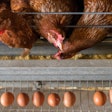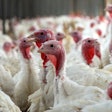
A potential change to USDA Grain Inspection, Packers and Stockyard Administration (GIPSA) policy could endanger the financial incentive for pig farmers to meet consumers’ demand for pork raised under certain conditions, such as without antibiotics.
However, a moratorium on regulations and an executive order by President Trump raise questions about the future of GIPSA’s policy change, said Mark Dopp, senior vice president of regulatory affairs with the North American Meat Institute, during his presentation at the International Production and Processing Expo in Atlanta, Georgia, USA on February 1.
How GIPSA’s policy change would affect pig farmers
The change to GIPSA policy would make it easier for a plaintiff to win lawsuits that allege a livestock processing plant had shown preferential treatment to one pig farmer over another. Specifically, these cases relate to situations where a processor makes an agreement with a pig farm to raise pigs under certain conditions, such as antibiotic-free or without gestation crates.
Previously, the policy held that the plaintiff would need to show that a processor’s actions had harmed competition. The new interim final rule, which is published but not implemented, would remove that stipulation, and the plaintiff would only need to prove personal harm.
That change would stifle the ability of pork processing plants to forge agreements with particular pig farms to provide pigs raised in a particular manner, said Dopp. A competing pig farmer could file a lawsuit claiming that the agreement reduced their ability to sell their pigs to that plant. It would then force the processor to legally prove that there was a specific reason they didn’t buy the competitor’s pigs, even if that pig farm had a history of unreliability.
Instead of risking that legal battle, pork processors may choose to avoid forming pre-determined agreements, said Dopp. That would then reduce pig farmers’ incentive to take on the added expense of using husbandry techniques that consumers demand, such as pasture raising or no antibiotic use, since they weren’t assured of selling those pigs for a premium.
Regulatory moratorium and GIPSA policy
The status of the new rule is unclear under the new US administration, said Dopp.
On January 20, a memo from US Chief of Staff Reince Priebus ordered a moratorium on new regulations, which pushed back the effective date of published, but not implemented, regulations to March 21. Then on January 30, President Trump issued an executive order stating that new proposed regulations would need to be accompanied by the removal of two or more regulations.
Those new regulations also would need to have no net cost, though it’s unclear if that refers to the public or private sectors or both, said Dobb. In other words, Dobb believes the cost of new regulations would need to be offset by removing the costs of existing regulations.
Since implementing the new GIPSA rule would cost an estimated US$30-100 million, Dobb wonders if the policy change will need to find other regulations to cut that will balance out that cost, since the change was not implemented before the executive order. That could prove challenging, and calls into question the ultimate implementation of the interim final rule.
Currently, bureaucrats are waiting for officials to be appointed by the Trump administration before taking action of the GIPSA change, said Dobb, since it’s unclear who will make the decision on what regulations to cut to offset the new policy.
















